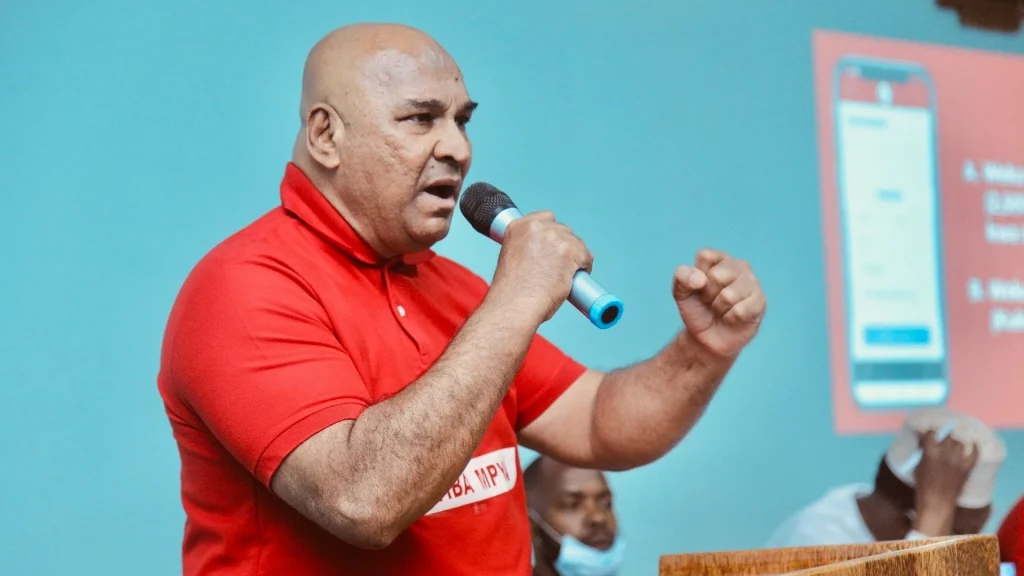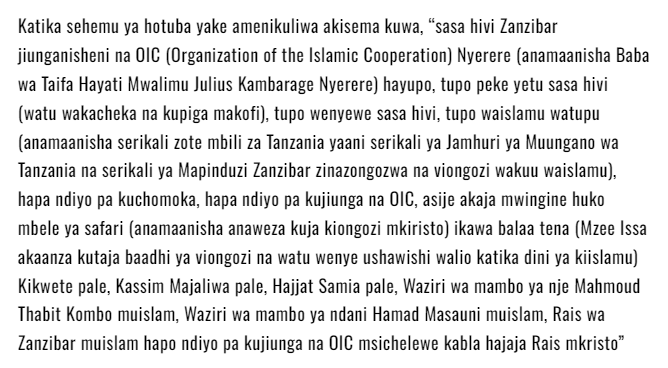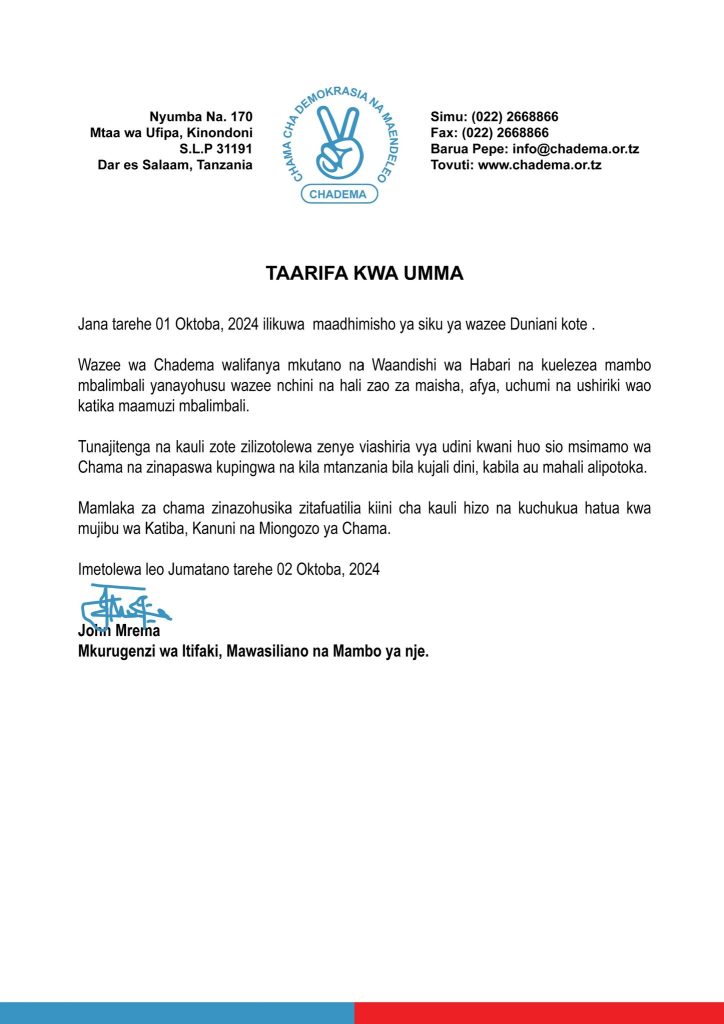On 01st October 2024, during International Day for Older Persons, one senior Chadema official urged Tanzanian Muslim leaders to join forces and ensure Zanzibar joins the Organization for Islamic Cooperation (OIC).
He cited that both presidents in the Union and Isles were Muslims, so there was nothing to stop them from joining the OIC.
He was also upbeat that the retired president Jakaya Kikwete is a Muslim to rest his cockeyed case in favour of Tanzania joining the OIC.
The protagonist, armed to the teeth with a polarizing diatribe, blamed the leaders for not helping the unemployed youth in Zanzibar and claimed, without citing any evidence, that OIC holds a golden key to the Zanzibar job market.
READ FULL STORY HERE: Siasa Za UDINI Jukwaa la Chadema, Kulikoni?
He blamed the leaders for failing to build a state-of-the-art port in Zanzibar, which had the potential to unlock the economic breakthrough needed to unleash a huge market for the unemployed youths, numbering in the millions.
Chadema, on 02nd October 2024, through its director of protocol and foreign affairs, Mr. John Mrema, wrote a scathing open letter distancing itself from what it termed as “divisive religious or tribal sentiments” were not Chadema approved policy, and the instigators will be dealt according to party disciplinary standing orders and regulations.
This article chronicles the ups and downs of African OIC members to examine whether their economic status supports the argument that being an OIC member is an economic boon.
OIC—Organisation of Islamic Nations is the collective voice of the Muslim world, ensuring and safeguarding its interests in economic, socio-political, and other areas.
The Organisation of Islamic Cooperation (OIC) is the second largest intergovernmental organisation after the United Nations. Its membership includes 57 states covering four continents.
The OIC has institutions that implement its programmes. Its Headquarters is in Jeddah, Kingdom of Saudi Arabia.
Member Countries: The 57 OIC Has Members
The following are member states of the OIC: Afghanistan, Albania, Azerbaijan, Bahrain, Bangladesh, Benin, the United Arab Emirates (UAE), Brunei Darussalam, Burkina Faso, Algeria, Djibouti, Chad, Indonesia, Morocco, Cote d’Ivoire, Palestine, Gabon, Gambia, Guinea, Guinea Bissau, and Guyana.
Others are Iraq, Iran, Cameroon, Qatar, Kazakhstan, Kyrgyzstan, Comoros, Kuwait, Libya, Lebanon, Maldives, Malaysia, Mali, Egypt, Mauritania, Mozambique, Niger, Nigeria, Uzbekistan, Pakistan, Senegal, Sierra Leone, Somali, Sudan, Surinam, Syria*, Saudi Arabia, Tajikistan, and Togo.
Tunisia, Türkiye, Turkmenistan, Uganda, Oman, Jordan, Yemen are also in OIC.
Syria’s membership was suspended at the Fourth Extraordinary Islamic Summit Conference of OIC, held in Makkah from 14 to 15 August 2012.
The Organization has 5 Observer Countries: the Turkish Republic of Northern Cyprus (also known as the Turkish Cypriot State), Bosnia and Herzegovina, the Central African Republic, the Russian Federation, and Thailand. Türkiye’s Membership status: Türkiye has been a member since the establishment of the Organization.
OIC Charter:
The new Charter, adopted at the 11th OIC (Organisation of the Islamic Conference) Summit held in Dakar on 13-14 March 2008, replacing the OIC Charter adopted in the 3rd CFM Meeting held in Rabat in 1972, is the main founding document of the Organisation.
The Charter states the Organisation’s objectives and principles and determines the rules for membership, observer status, amicable dispute settlement, budget, finance, and operational rules.
The new Charter, which revised and substituted the 1972 previous Charter, has been a crucial milestone for reforming the Organisation.
The New Charter establishes the legal basis and organs necessary for cooperation and activities among Islamic countries by the contemporary requirements of the new environment, which have emerged as a result of radical changes in the international forums since 1972.
Türkiye signed the new Charter at the 35th CFM Meeting (in Kampala/Uganda on 18-20 June 2007), and the Charter entered into force on 16 June 2012 as concerns Türkiye.
OIC Members in Africa
African countries in OIC are 28, which are Algeria, Benin, Burkina Faso, Cameroon, Chad, Comoros, Djibouti, Egypt, Gabon, Gambia, Guinea, Guinea-Bissau, Ivory Coast, Libya, Mali, Mauritania, Morocco, Mozambique, Niger, Nigeria, Senegal, Sierra Leone, Somalia, Sudan, Togo, Tunisia and Uganda.
Neither of the African countries mentioned above has benefited in the manner falsely stated by the Chadema leader.
I know there are annual contributions, and for new members, the annual contributions are assessed as one-twelfth of the estimated contribution. The figure is variable and not fixed.
Why Was The OIC Established?
The Organization of Islamic Conference was established by the decision of the First Islamic Summit Conference, which was held in Rabat from 22 to 25 September 1969.
This was done upon the reactions of the Islamic World, provoked by the arson attack against Al-Aqsa Mosque, the third holy site in Islam and located in Israeli-occupied Jerusalem, by an Australian extremist Jew on 21 August 1969.
The Office of Secretariat General was established at the 1st Meeting of the Council of Ministers of Foreign Affairs in March 1970. A Secretary-General was appointed, and it was decided that the Secretariat would operate in Jeddah until the liberation of Jerusalem.
The Organization of Islamic Conference’s name was changed to the Organization of Islamic Cooperation (OIC) at the 38th Council of Ministers of Foreign Affairs (CFM) meeting, held in Astana from 28 to 30 June 2011.
Issues relating to Palestine have been central to the OIC’s agenda and summit discussions. The organisation has continuously condemned what member states consider Israeli aggressions against the Palestinians.
Other issues that have also taken centre stage in OIC summits include the wars in Bosnia and Iraq, a rise in the number of refugees from Muslim-majority countries such as Syria, as well as Islamophobia in the West.
The OIC’s mission statement bills it as “the collective voice of the Muslim world” that works to “protect the interests of the Muslim world”. It was established by 24 member states in 1969.
Today, with 57 member states from four continents, the OIC is the second-largest intergovernmental organisation in the world after the United Nations, with a collective population reaching over 1.8 billion people.
The majority of its member states are Muslim-majority countries, while others have significant Muslim populations, including several African and South American countries.
While the 22 members of the Arab League are also part of the OIC, the organisation has several significant non-Arab member states, including Turkey, Iran and Pakistan.
It also has five observer members, including Russia and Thailand. The organisation has permanent delegations to the UN and the European Union, and its official languages are Arabic, English and French.
According to its charter, the OIC aims to preserve Islamic values, safeguard and defend member states’ national sovereignty and independence, and contribute to international peace and security.
While the organisation has been known for its cultural and social projects, its political influence has been limited.
“Typically, in the past, the OIC has been effective in promoting cultural and educational projects across the Muslim world,” Sami Hamdi, a Middle East expert, told Al Jazeera.
“However, its political capabilities remain severely limited.”
“With 57 member states… the OIC carries a [relatively] heavy political weight… [and] impact. But how much change that makes on the ground is not always clear,” said Alabbasi. Its political limitations include its inability to unify its stance on issues, say experts.
“Like other international organisations, such as the UN General Assembly, the OIC is supposed to have a unified voice, but it does not because the policies of the individual countries differ greatly,” said Alabbasi. “Most importantly, the OIC doesn’t have a unified voice because most of its member countries are not democracies. So, while their populations may be in agreement [over an issue] they do not always represent the views of their populations.”
Hamdi agrees: “The OIC has a broad spectrum of different cultures. This means that on the political front, even if there is a united stance, it means very little, practically.”
Is The OIC Relevant Today?
The OIC is the carbon paper of the Arab League, and its effort to widen its appeal under the guise of economic benefits aims to have an effective global voice.
However, the African OIC members have obtained very little economic development. Most development initiatives have been through countries by countries without an OIC coordination role.
Moreover, the OIC is powerless to reconcile warring sides that are members, let alone intervene to protect one of its own.
For All Purposes and Intents, The OIC is a Talking Shop
OIC members such as Iraq and Afghanistan endured a two-decade each military assaults by America and some NATO members without OIC doing anything about it.
The OIC, whose Charter promises to protect the sovereignty of member states, was never invoked!
Weirdly, during the Iraq war with the US, Saudi Arabia sided with the aggressor. Iran and Iraq fought a nine-year war, and the OIC did not help negotiate peace. During the American aggressions against Iraq, Iran confiscated warplanes of Iraq that were taken there to protect them against American strikes.
Sudan is in civil war, and many OIC members have sided with one of the two factions. OIC is only unified in its hatred of the existence of the state of Israel, but beyond that, they have nothing in common to glue them together.
Still, Palestinians in Gaza and Hezbollah in Lebanon are being decimated by Israel, and the OIC is in hiding, having nothing to do with the conflict, deciding an AWOL was in its collective best interest.
So, all the hyperbolic claims that the OIC will pull Zanzibar out of her economic challenges are based on misinformation and outrageous lies.
OIC membership will certainly add a few mosques in Tanzania to allow the faithful to pray, but that alone will not help create the jobs the Chadema instigator was clamouring for.
Arabic culture, language and Islamic faith will see a boost, but OIC will never build a port. They have never done that anywhere in African OIC members.
We must learn fast to appreciate that development is within our means, and foreign aid comes with conditions to wrestle our sovereignty away from our own hands. Just like a saying that reminds us:”..there is no free lunch” does more service in closing this subject for good!
What OIC is seeking from us is a consortium with Islamic benefits. In my concluding remarks, I would like to point out that the Israel- Palestine wars are spiritual ones, and no man-made solutions can resolve them.
Both parties to an eternal conflict aim to annihilate the other. Both sides have embraced a perpetual maximalist option of kicking out the other.
This is why there will never be any settlement except if both sides surrender their hearts to the Prince of Peace, the Lord Christ Jesus. Amen. However, neither side is willing to do just that. As a result, bloodshed will continue until the end of the Ages.
Who, in his right senses, would like to squander his life by joining a spiritual conflict whose outcome is known even before one bullet is fired? Even a two-state solution is a Western world fallacy, seeing that the scripture commanded both Israel and Palestine to live side by side under One God: the Prince of Peace, Christ Jesus, the Amen.
The two-state solution is a demoniac deception since it separates the duo from their God, and it will never work.
Whatever economic gains under the OIC umbrella are mere official bribes to entice us to support the Arab League in her forlorn effort to liberate Jerusalem from Israel.
This will never be our fight, not now, not ever! That is not God’s plan for this beautiful nation.
Really, are we not better than this? Meddling in a far-flung conflict that was never divinely designated to be ours?
The scripture says whoever meddles in a conflict, not his, is akin to the one who holds a Bulldog by its ear. Will he not get bitten for his “kiherehere”?




